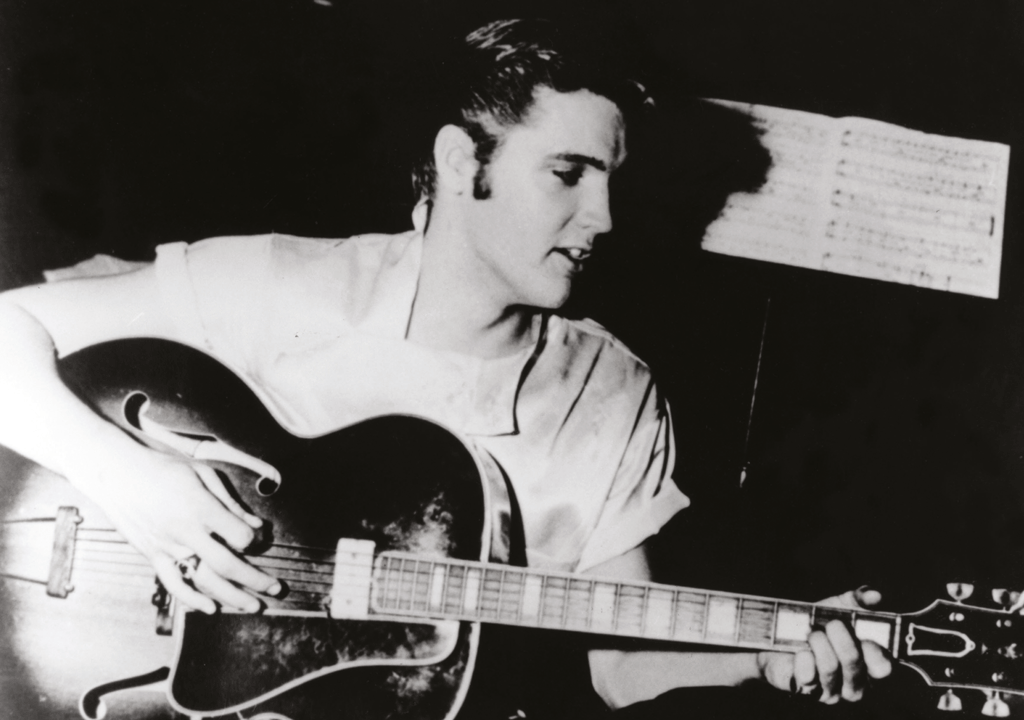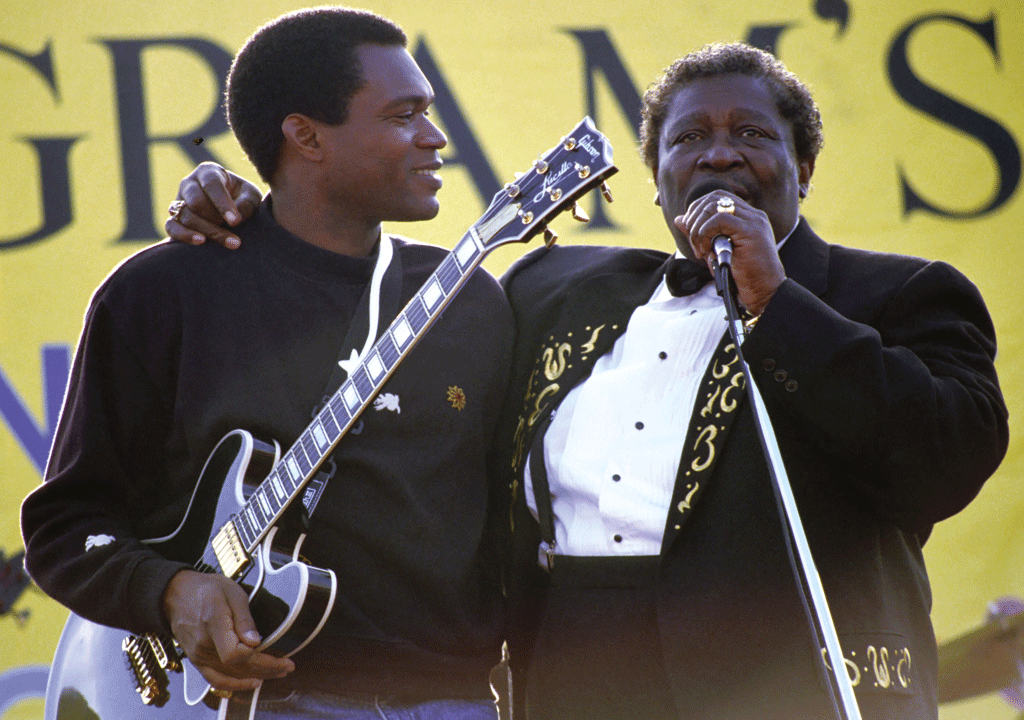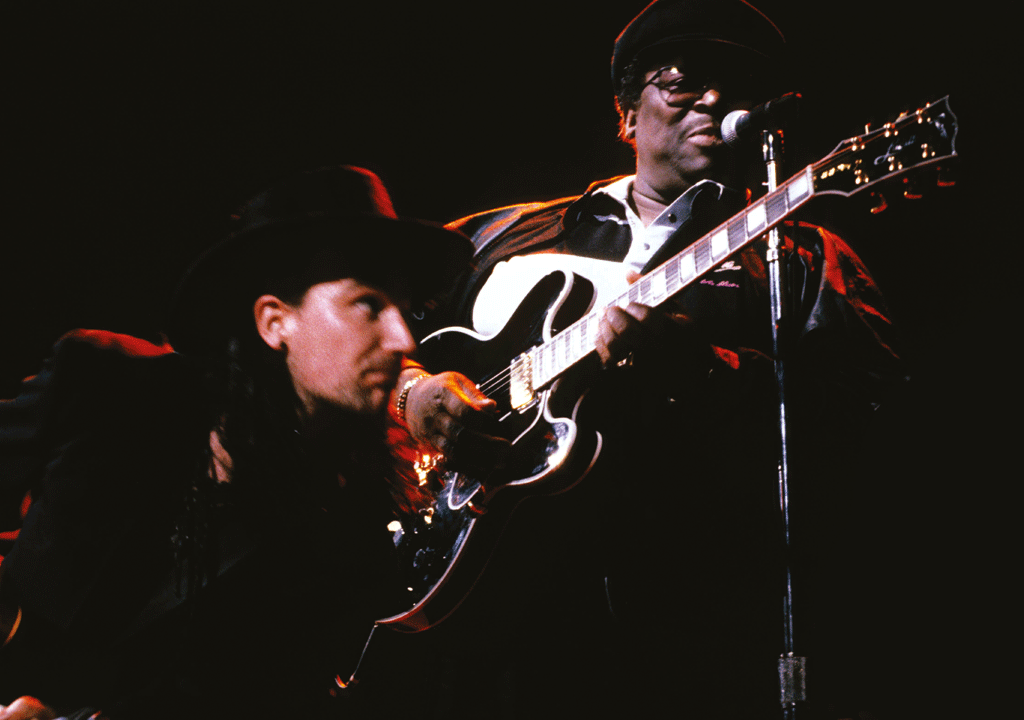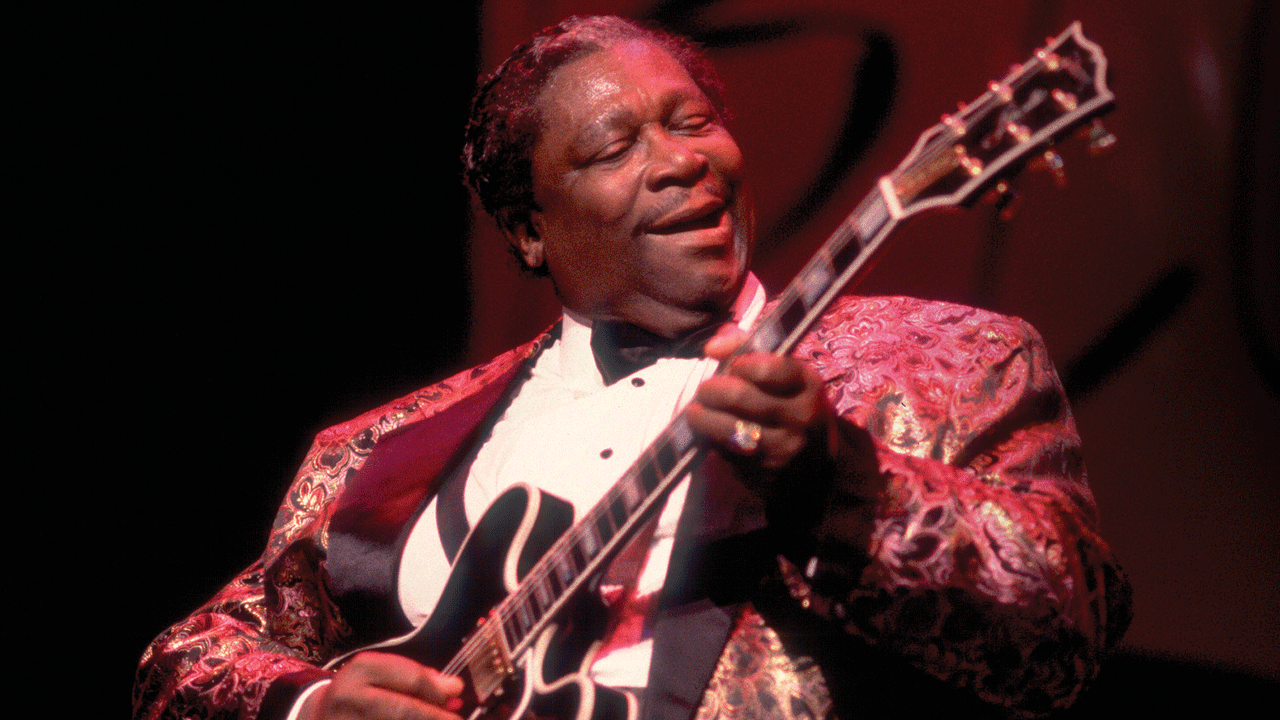It is a Saturday night in Paris in November 1992, and love has clearly come to town. Backstage, at Le Zénith arena, the crew have formed a guard of honour outside the main dressing room. The door opens, and out steps BB King, a colossal presence in a white dinner jacket and black bow tie. Everyone breaks into applause. It’s an impressive moment, but nothing on the sight of 6,000 people being brought to their feet as the king of the blues walks on stage minutes later.
BB King, who has just released a definitive 77-track box set, is halfway through a three-week European tour with the Robert Cray band. I am here to interview both acts as part of a blues boom special for Vox magazine.
On stage and off, BB King radiates warmth and geniality, and Robert Cray sums up the mood of the night when he says, “Just to be around the guy is a whole good feeling.” /o:p
In the booklet for the King Of The Blues box set there is a quote from you from 1957 saying, “Our music is blues, straight from the Delta, and I believe we’ll make it on that.” Do you think you have made it on that?
“When I said blues from the Delta, I was imagining a type of music that comes straight from the heart. People generally use the words urban blues, Chicago blues, but I said, ‘I’m from the Delta and I believe I’ll make it’, thinking along those terms. I didn’t think, though, then I guess, and I don’t think today, that you stay with the same thing exactly, you have to add to it a little bit.”/o:p

Above: the other king, BB’s old friend Elvis.
These days you live in Las Vegas, don’t you?
“I’ve lived there since 1975.”
What was it about Vegas that made you want to move there?
“I had a five-year contract [laughs]. It was at the Las Vegas Hilton. I played there this year – I was there with a young man called Jay Leno, who has just taken over The Tonight Show, and I did my show, featuring him, at Caesars Palace.”
You’ve cited quite a few bluesmen who had an influence on you when you first started out as a musician, like T-Bone Walker and your cousin Bukka White, but if you had to single one person out, who would it be?
“That’s hard for me to answer, to be honest and truthful. There’s two people in the blues that would have influenced me – Lonnie Johnson and T-Bone Walker. Then when I say two, I see three. But I guess I’d have to wind up saying T-Bone Walker, because he was more contemporary, playing with an electric guitar. Hearing him with an electric guitar was the one thing that really, as they use that phrase, blew my mind. I think T-Bone Walker is an honest answer.”
You knew Elvis when he first started out. You used to hang out on Beale Street together, didn’t you?
“Not actually on Beale Street, although I hate to break up that story because it sounds so good. But when Elvis was first starting – I guess I’d been playing for many years at that time – we used to go to Sam Phillips’ studio and so we would see each other after that, and see each other until he started getting very popular and then I didn’t get the chance to see him any more. So I guess it would be fair to say, yes, we did spend some time together.”
Recently Public Enemy had a song in the Spike Lee movie Do The Right Thing, And they…
[King takes a photograph of him and Elvis out of his pocket.]
Wow, that’s great!
“I didn’t know you were going to ask me that question, but I carry it in my pocket – a picture of Elvis and myself when we were both very young. Of course, I was much older than him.”
…Public Enemy have done a song called Fight The Power, and one of the lyrics is that Elvis was ‘straight up racist’. Seeing as you knew him, what do you think about that?
“What, that he was a racist? He was brought up in a segregated society like I was. If a white person wanted to make it and a black person wanted to stay alive, then it wasn’t smart to do too much association socially. I didn’t think he was racist – he wasn’t to me and I can only speak for myself. Some people like to make headlines, but I’m not like that. I’m trying to tell you the way it was with me.”
Did you ever share a bill with him?
“We never played on the same bill but this hotel that I was telling you about, which made me move to Las Vegas, he would be the headliner in the main showroom and I would be the headliner in the lounge. We did that many times over five years. In that Las Vegas Hilton, the lounge theatre would hold about 1,000 people, the main theatre would hold about 10,000 people. But he would be there.”
You first met him when you were recording at Sam Phillips’ studio?
“Yes. He hadn’t started then, he was trying to get ready to start. He would practice, yes.”
Is that when you did that song She’s Dynamite?
“Yes, that was around that time.”
You’ve had a series of Lucilles over the years, haven’t you?
“Yes, I’m now playing Lucille the 16th, right over there [nods to his guitar].”/o:p
You’ve talked about the music you heard on jukeboxes when you were growing up and your aunt Jemima, who gave you Jimmie Rodgers records. Did you like a lot of country music?
“Yes, the way I got started into trying to read music was through country music books, because that was the only books that I had, or rather could get. It was a mail order company in the USA called Sears Roebuck. Today it’s just called Sears – s-e-a-r-s, I have to spell because of my Mississippi accent sometimes so people may understand me. But I wanted to learn to read music, so in order to do that I would order books from Sears Roebuck. These books were by an author and a teacher called Nick Manoloff and he had these books on learning to read music, musical notation. He’d have the big notes there, so I think one of the first notes, speaking musically, was [sings], ‘oh my darling, oh my darling, oh my darling Clementine.’ I could read that and that’s how I first started learning to read music. So country music was very popular in my life at that time.”
You’ve said that, although you’re more successful than you’ve ever been, you’re still searching for that certain sound.
“Yes.”
Do you think you will ever find it?
“I pray that I do [laughs]. I hope so.”
Have you got it in your head?
“Yes, I hear it, but I can’t… it’s kind of like a story I once heard – some wise person had three blind men standing beside an elephant. They put one man at his side, one at his tail and one at his trunk and got them all to describe what an elephant looked like. As none of them could see, they were all describing the parts they felt. That’s the way I am about the sound in my head – it’s there, but I just don’t know how to bring it out. I believe that I’ll find it one day, though.”
Has it been the same sound for a while or has it changed over the years?
“What happens is, I hear it, but I can’t quite put it together. It’s like those three blind men. One said that the elephant was wide like a big slab of meat, that was the one on the side. The one on the tail said, ‘Well, he’s big, it feels kind of like a snake’, and the one upfront said, ‘Oh no, he’s very big, he’s got a tentacle like an octopus’, so that’s kind of like the way the sound is in my head. I can’t quite put it together.”/o:p

Above: King hands over Lucille to Robert Cray at the 1991 San Francisco Blues Festival.
You’ve written loads of songs, so it’s probably hard to choose, but do you have a favourite?
“Oh yeah, it’s called A Mother’s Love and I don’t think nobody but me bought it [laughs].”
Is that the one that you just started doing impromptu in the studio? It’s on the box set, isn’t it?
“I haven’t noticed if it’s on there or not, but it’s got a big orchestra. If I sound like I just did it, well, maybe that’s why nobody else bought it [laughs a lot]. You’re not thinking of Nobody Loves Me But My Mother, are you? The one I’m talking about is sort of ballad-like and it goes that the mother, regardless of what you may do or how you look or what you may or may not have, this person loves you genuinely and will protect you at all costs. That’s not actually in the song itself, but that’s the start and it’s my favourite of all the songs that I’ve ever done. And of all the songs that I know, Willie Nelson’s rendition of Always On My Mind is my favourite song of all time.”
These are my last couple of questions…
“That’s okay, you don’t have to rush, I’m enjoying talking with you. Go ahead.”
Thanks. What do you think of Robert Cray and why you like playing with him?
“He’s a superstar. I enjoy him. Not only that, I don’t think he’s reached half his potential yet. I think he’s just touching the surface at this time and he’s really a superstar already.”

Above: hum together, BB and U2’s Bono.
He played with you at your birthday party, didn’t he? [At the San Francisco Blues Festival in September 1991, Bobby McFerrin, Boz Scaggs and other luminaries joined King on stage to present him with a cake and sing happy birthday. King beckoned Robert Cray saying, “It takes a very special person to play Lucille” and handed him his beloved guitar.]
“Yes, that was very sweet of him. We were jamming to a song – it seemed to me like it was Every Day I Have The Blues, yes, I believe it was – and Robert came in. He’s one of the few people that’s ever played my guitar. And the first one in public.”
Are there any other young musicians that you would like to play with?
“I think it’s easier to ask me which ones that I do not like.”
Go on then…
“I don’t know any that I do not like [laughs]. Everybody’s playing things that I wish I could play. It seems to me that they seem to get it right away. Not only do they get that, they surpass all the other things. The ideas about technology and all of that is so much greater than it was with me and a lot of other guys, and it’s just a treat to be alive and around them.”
Your popularity has taken quite a leap recently, hasn’t it?
“Well, I like to kind of boast a little bit. In my lifetime, I’ve had the chance to work with two of the number one groups in the world. The Rolling Stones were the first and then U2 were the second.”
What effect do you think being featured in the U2 movie, Rattle And Hum, had on your career?
“It was a 180-degree move in a positive direction for my career. One of the things I’ll never be able to thank U2 for enough is that they froze my picture for at least six seconds in that movie, so a lot of the kids had a chance to see me. Now the sky’s the limit. I’m still alive and there’s a whole lot I’d like to do.”
King Of The Blues box set was released in 1992 via Geffen.

